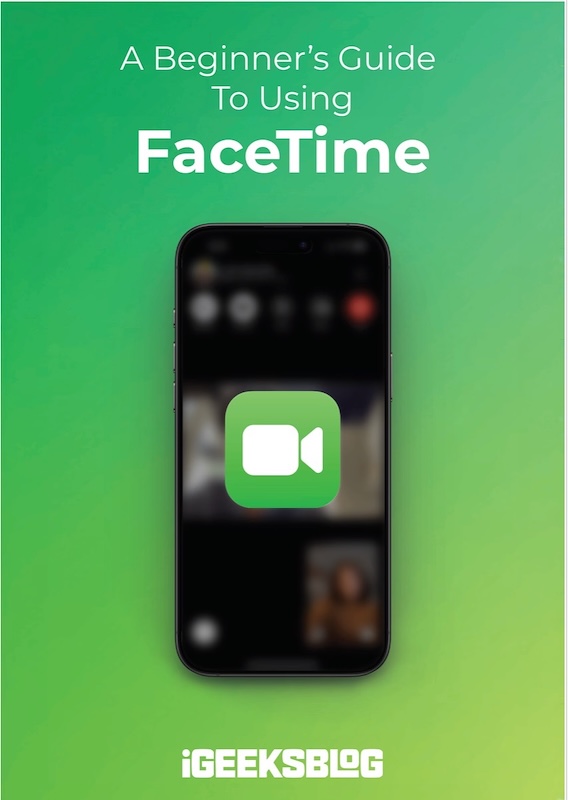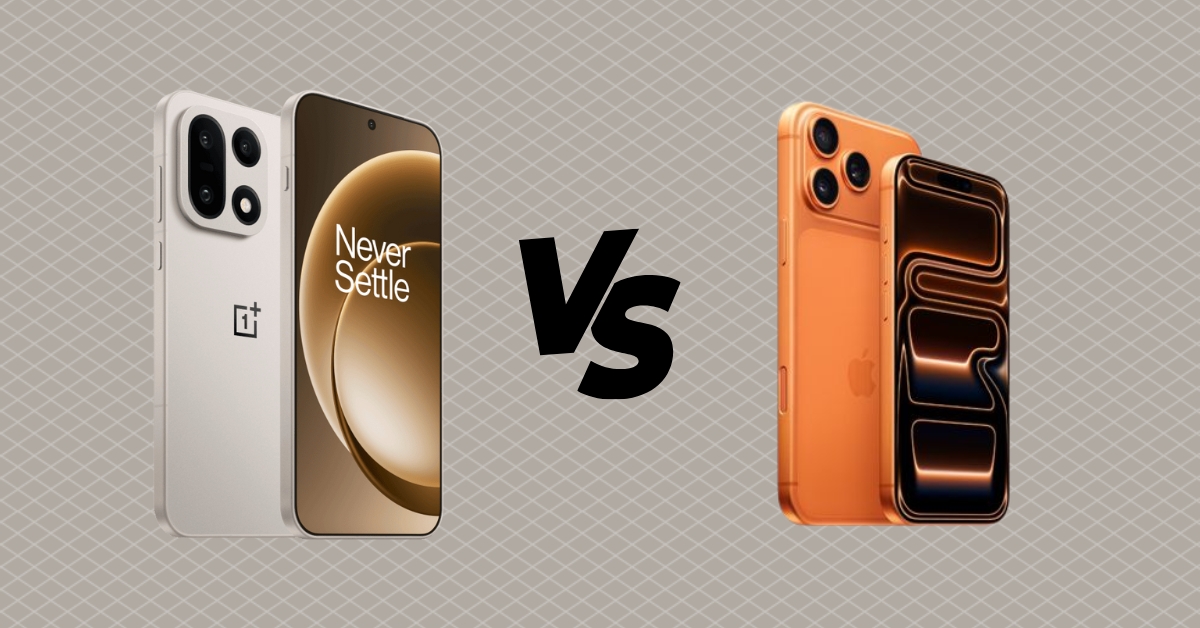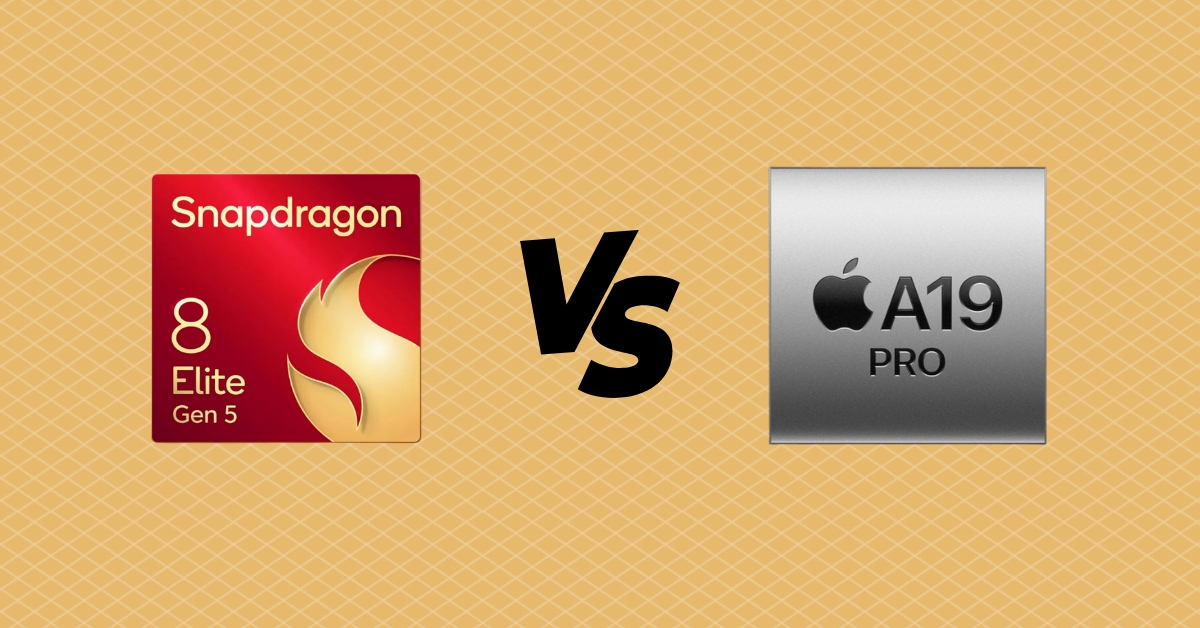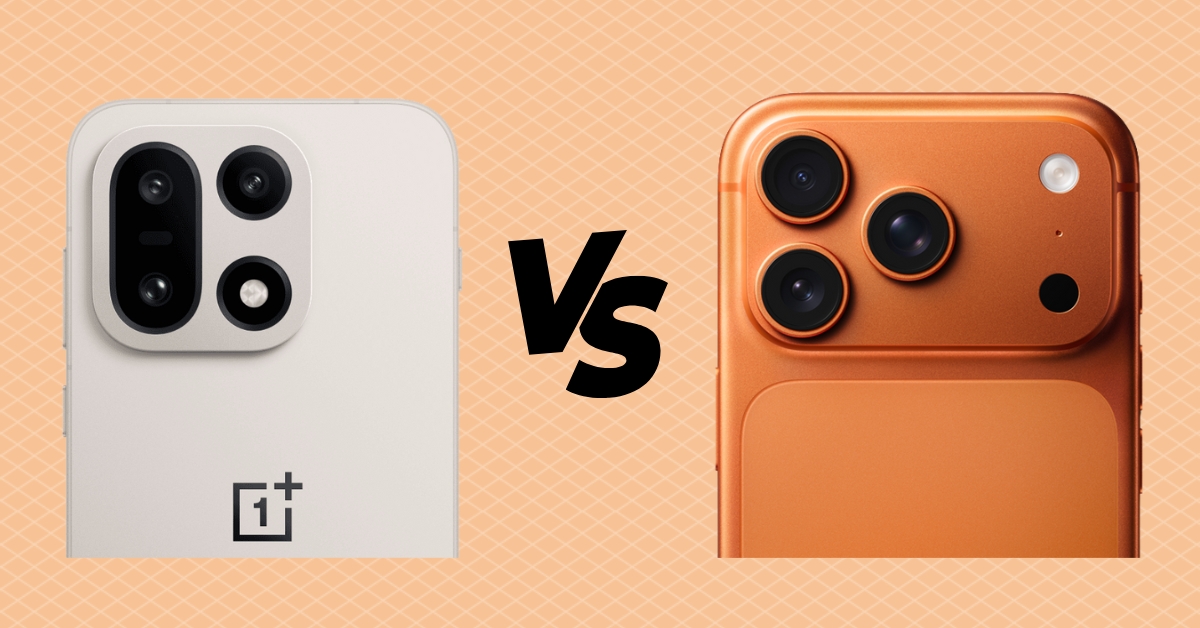
FaceTime Like a Pro
Get our exclusive Ultimate FaceTime Guide 📚 — absolutely FREE when you sign up for our newsletter below.

FaceTime Like a Pro
Get our exclusive Ultimate FaceTime Guide 📚 — absolutely FREE when you sign up for our newsletter below.
Stuck between the OnePlus 15's huge battery and the iPhone 17 Pro's camera? We break down the real-world differences to help you choose!
OnePlus has officially launched the OnePlus 15, and on paper, the numbers look wild. A massive 7,300mAh battery, 165Hz display and the latest Snapdragon 8 Elite Gen 5 make it one of the best Android phones you can get. But how does it fare beside this year’s iPhone 17 Pro? What advantages does each model have? How do specs translate in daily usage? If you’re stuck between the OnePlus 15 and the iPhone 17 Pro, this detailed comparison will make the choice clear.

Phones have gradually gotten heavier over the last few years, and both of these continue that trend. OnePlus 15 lands at around 215g, and the 6.78-inch display almost feels like a mini tablet in hand. The iPhone 17 Pro, on the other hand, weighs 206g. That difference may look small on paper, but it is noticeable when you switch between the two. But both can be considered heavy for day-to-day use.
| Category | OnePlus 15 | iPhone 17 Pro |
|---|---|---|
| Thickness | 8.1mm | 8.8mm |
| Weight | 215g | 206g |
| Build | Textured glass + square camera housing | Ceramic Shield 2 + playful colours |
| Feel | Big, heavy, media-first | Compact, premium, everyday-friendly |
However, the build quality of both phones feels premium. OnePlus has a textured glass back and a new square camera design, which looks very minimal and is also soft to hold. The iPhone 17 Pro takes a different approach. It has more playful color options than OnePlus and even previous Pro models, especially the Orange variant.
This is where things are very different. The OnePlus comes with a massive 6.78-inch LTPO AMOLED QHD+ panel with a 165Hz refresh rate, making it a strong display for gaming and other media-focused use. Supports Dolby Vision and HDR10+. But 165Hz is only used in specific games, like COD, which OnePlus supports. For most of the time, you will be on 120Hz.
whereas the iPhone 17 Pro has a 6.3-inch Super Retina XDR OLED LTPO panel at 120Hz. Comparatively, OnePlus is a bit better for media consumption or even just navigating the UI. But remember
However, the OnePlus 15 only reaches 1800 nits of brightness, while the iPhone 17 Pro reaches 3000 nits. While the experience difference is not as dramatic as the numbers suggest, you will definitely find the iPhone more comfortable to use outdoors.
| Display spec | OnePlus 15 | iPhone 17 Pro |
|---|---|---|
| Size | 6.78‑inch | 6.3‑inch |
| Resolution | QHD+ | Super Retina XDR |
| Refresh rate | 165Hz | 120Hz |
| Peak brightness | 1800 nits | 3000 nits |
| Ideal for | Gaming, movies, multitasking | Creators, colour‑critical work |

| Benchmark | OnePlus 15 (Snapdragon 8 Elite Gen 5) | iPhone 17 Pro (A19 Bionic) |
|---|---|---|
| AnTuTu (v11) | 3,688,274 | 2,430,575 |
| Geekbench single‑core | 3493 | 3775 |
| Geekbench multi‑core | 10,692 | 9,749 |
| 3DMark (GPU throttling test) | Wins long‑run stability | Wins first run burst |
Inside, the OnePlus 15 uses the Snapdragon 8 Elite Gen 5: a chip built for high-intensity workloads. It sprints. Launching games, multitasking, and heavy apps feel instantaneous. Thermal control is better, too, so heating and frame drops show up far less. In pure benchmarks, it beats the latest iPhone on both AnTuTu and Geekbench’s multi-core tests.
However, the iPhone 17 Pro’s A19 Bionic chip is more optimized, and the new vapour chamber helps it last longer in games. And frankly, both devices are great options for performance, even when you throw a heavy task or game at them for hours. If performance is your priority, you can pick either mode, and you will not be disappointed with the results.
Both Operating systems are well-developed, optimized and feature-rich. The ultimate choice may come down to the classic Android vs. iPhone debate. While each OS and model has its own unique features, the main buying factor depends on how the device fits into your existing ecosystem and which side you prefer.
OxygenOS 16 on the OnePlus 15 blends Google Gemini AI with OnePlus‑exclusive Plus Mind features, which personalise the phone based on usage patterns, routines and habits. You get auto‑organising home screens, context‑aware suggestions, voice summaries on demand and deeper device‑level customisation.
iOS 26 with Apple Intelligence takes a different route. The focus is on privacy, on‑device processing, and the Apple ecosystem. While there are some AI features like writing tools, priority notifications, genmoji and upgraded Siri, it’s still not as good as Google Gemini on the OnePlus. However, Apple may partner with Google to make Siri powered by Google Gemini; however, it’s far in the future and may or may not happen. No official announcement yet.
While OnePlus offers 4 years of updates and 6 years of security updates, Apple provides approximately 7 years of software update support.

| Camera spec | OnePlus 15 | iPhone 17 Pro |
|---|---|---|
| Main sensor | 50MP f/1.8 | 48MP f/1.8 |
| Ultrawide | 50MP f/2.0 | 48MP f/2.2 |
| Telephoto | 50MP 3.5x optical | 48MP 4x optical |
| Video | 8K/4K 120fps, LUT preview, Dolby Vision | 4K 120fps, ProRes, Apple Log, Dolby Vision |
| Selfie | 32MP | 18MP + FaceID depth |
On paper, both devices are solid, and in many cases, the OnePlus beats the iPhone. However, today’s smartphones are more about camera processing, and this is where OnePlus falls behind.
iPhone 17 Pro photos are sharp, vibrant, and detailed in both daylight and night conditions. iPhone images also have better depth. While OnePlus gets the job done most of the time, it can be inconsistent, especially at night when there isn’t enough light. Selfies are good and consistent on the OnePlus, but the iPhone still takes the lead more often.
On the video front, aside from the ability to shoot 8K at 120 fps, OnePlus falls behind in color reproduction, low-light video, zoom quality, and even video stability. It still does a good enough job of uploading reels or even shooting a YouTube video, but compared to the iPhone, the difference becomes obvious.
| Battery & charging | OnePlus 15 | iPhone 17 Pro |
|---|---|---|
| Battery capacity | 7,300 mAh | ~3,692 mAh class |
| Wired charging | 120W | 20–40W |
| Wireless charging | 50W | MagSafe/Qi2 |
| Reverse charging | Yes | Limited (wired only) |
| Full charge time | 40–45 minutes | 75–90 minutes |
| Real‑world endurance | 1.5–2 days | 1 full day |
The above specs show OnePlus dominating the battery segment, and that holds true in daily usage as well. The difference is just as dramatic. With a massive 7,300 mAh battery, the OnePlus 15 packs 97.8% more capacity than the iPhone 17 Pro’s 3,692 mAh battery. You can easily push the OnePlus 15 to run two full days, or at least 1.5 days with heavy usage.
The OnePlus 15 is the kind of phone you can use from morning until late at night without battery anxiety: social media, gaming, camera, maps, YouTube, all on max brightness, and it still refuses to die. You don’t need to charge every night, and even when you do, plugging in for 10–15 minutes is enough to boost the battery by 45–55%.
The iPhone 17 Pro is reliable, but not competitive here. It lasts a full day for most users, and MagSafe still feels effortless. But if you spend a lot of time gaming, recording video, using GPS, or scrolling outdoors at high brightness, the battery drains noticeably faster than the OnePlus. And charging speeds feel outdated when you’re watching percentages crawl while the OnePlus rockets to 100%. MagSafe remains convenient, but convenience doesn’t replace speed.
To make the difference clearer at a glance, here’s a quick comparison of US pricing and storage options:
| Variant | OnePlus 15 | iPhone 17 Pro |
|---|---|---|
| Base model | $899 (12GB + 256GB) | $1099 (12GB + 256GB) |
| Higher storage | $999 (16GB + 512GB) | $1299 (12GB + 512GB) |
| Top variant | $1099 (16GB + 1TB) | $1499 (12GB + 1TB) |
If you want the most storage on a phone, the iPhone 17 Pro Max offers a 2TB option.
If you want next‑level battery life, gaming performance, and better AI features without gasping at the price, the OnePlus 15 is perfect. You get more for the money and fewer compromises. If you prefer the best camera, Apple ecosystem and long-term updates, then iPhone 17 Pro is your best bet.
However, there are mostly no wrong decisions here; one comes out ahead of the other, but in daily use, you find no major battery issues with the iPhone nor camera issues with the OnePlus.
Related articles worth reading: